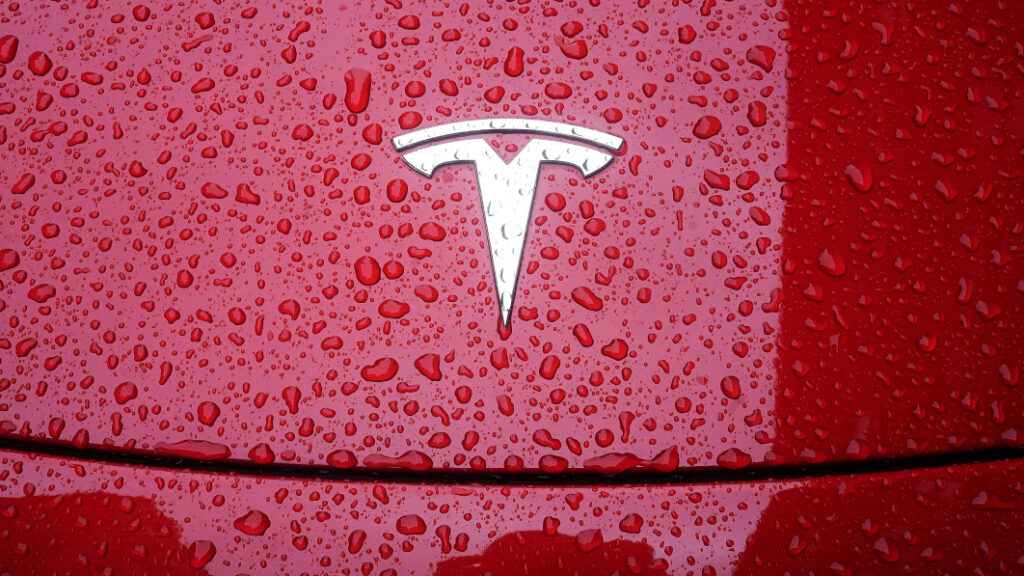Tesla’s slowing growth puts 'Big Seven' status under a spotlight

Tesla’s massive valuation has put it among the biggest firms making up the backbone of the U.S. stock market this year. It’s also the biggest underperformer in that group, and there are signs Wall Street’s excitement is fading.
The EV behemoth stands out as the only one of the seven biggest companies in the S&P 500 Index — a group that also includes Amazon, Microsoft, Apple, Alphabet (Google’s parent company), Meta (Facebook’s parent company) and Nvidia — whose estimated profit for 2024 has declined significantly from where it was a year ago.
Tesla shares have been the worst performer in the group by a significant margin, since the third-quarter earnings season kicked off in mid-October. The stock sank fast after the company’s chief executive officer Elon Musk dialed back growth expectations amid slowing demand and dour forecasts from other automakers.
For the most recognizable EV brand and the largest pure-play EV-maker globally, the slowdown means further scrutiny on Tesla’s premium market valuation of about $690 billion — a level that leaves little room for error. Its share of bullish analyst ratings is at the lowest since April 2021, reflecting growing skepticism.
“The outlook for EV demand is a big problem for Tesla,” said Matt Maley, chief market strategist at Miller Tabak + Co. “Their continued price cuts are taking their toll, so lower demand is only going to exacerbate this issue.”
Shares of the company traded at 56 times their forward earnings as of Thursday’s close, compared with the mid-single-digit multiples of legacy auto companies General Motors and Ford Motor, according to data compiled by Bloomberg. More importantly, Tesla’s price-to-earnings ratio is significantly higher than that of even its other mega-cap counterparts.
Analysts on average now expect Tesla’s 2024 earnings to be about 40% lower than what they were estimating 12 months ago, according to data compiled by Bloomberg. For the other six, the estimates have either risen over the same period or fallen very slightly.
Bullish investors on Tesla are “still looking out to mid-decade and not the current demand environment,” to focus on the next car, the self-driving technology and the humanoid robot Optimus among others, Cowen & Co. analyst Jeffrey Osborne said in an interview. He added that valuing such longer-term potentials are challenging given the current economic uncertainty.
“I have a hard time being bullish on things beyond cars, especially technologies that don’t work yet and may never work, particularly the full-self-driving software,” Osborne added.
The cornerstone of Tesla’s valuation remains the EV business, where risks have been climbing fast. Rising interest rates have driven up car-ownership costs, squeezing consumers at a time of high inflation, and EVs being a new technology are suffering the most. Musk’s aggressive push to lower the price of Tesla’s cars hasn’t been seen to significantly boost demand.
Tesla’s lower-than-expected 2024 growth trajectory could be due to that broader slowdown in adoption, Deutsche Bank analysts Tim Rokossa and Emmanuel Rosner wrote in a recent note. The second wave of EV consumers may require a much cheaper starting price, and could be waiting for larger infrastructure — such as a charging network — to be built out.
“Although US consumers will start benefiting from $7,500 in EV incentive credit at point of sale as of Jan. 1, we fear that this alone might not be sufficient to accelerate the demand curve in the US in the near term, especially given in a record high interest rate environment,” the analysts wrote in a client note on Tuesday.
Despite that, believers in Tesla are keeping their faith in EVs’ longer-term potential, since most experts and analysts see electric cars as the future of the auto industry. And while competition to dominate that market will be intense, these investors are betting on Musk’s ability to keep the company ahead of the rest.
“EVs have some big problems, but Tesla is way beyond just an EV company because of Elon Musk,” said Matthew Tuttle, chief investment officer and CEO at Tuttle Capital Management. “Elon allows for a higher multiple than you would have if Tesla was just an EV company.”
Tesla shares have rebounded this week after the post-result selloff. The stock traded up as much as 2% right after the market open on Friday in New York.







